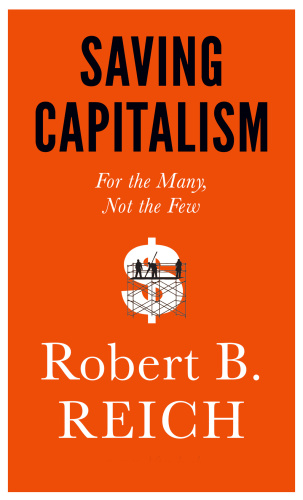
Saving Capitalism
For the Many, Not the Few
کتاب های مرتبط
- اطلاعات
- نقد و بررسی
- دیدگاه کاربران
نقد و بررسی

August 31, 2015
Reich (The Work of Nations), a professor of public policy at UC Berkeley, has written an arresting, thought-provoking treatise on the need to reverse the trend of income inequality in the U.S. One of the book’s central points is that the hot-button debate over whether the free market is more effective than government control is irrelevant, and directed at the wrong issue. In fact, Reich asserts, the “free” market is a myth, and the problem is not how big or small the government is—it’s who the government is there to serve. His solution is an “activist government” that will tax the affluent more, invest heavily in education and opportunities, and support the needy. In readily understandable language, Reich explores private property, bankruptcy, inflated Wall Street salaries, different definitions of freedom, the “rise of the working poor,” and the decline of institutions such as unions that were once able to challenge economic elites. Reich’s powerful final argument is that Americans need to rid themselves of the idea that it’s too late to change their economy; the market is a human creation, not a fact of nature, and only humans can save it from what it’s become. Agent: Rafe Sagalyn, ICM/Sagalyn.

August 15, 2015
An accessible examination of how the "apparent arbitrariness and unfairness of the economy [has] undermined the public's faith in its basic tenets." Since leaving the cabinet of the Bill Clinton administration, in which he served as secretary of labor, Reich (Beyond Outrage: What Has Gone Wrong with Our Economy and Our Democracy and How to Fix It, 2012, etc.) has worked a populist vein of protest against corporate excess. In this nontechnical economic manifesto, he opens with the nostalgic vision of an American past in which ordinary people could afford to buy a home and pay for college on a single income, a time long gone precisely because the economy has been reorganized for the benefit of the wealthy at the expense of the laboring and middle classes. Reich holds that government, long despised as the problem and not the solution, actually has a role, if abrogated, "in setting the rules of the economic game." In the absence of sufficient government oversight, the rich have been setting those rules, and-no surprise-an ideally level playing field tilts in such a way that they get all the goals. The author takes a measured view even as he argues against free market orthodoxies, insisting, "rules create markets," rules set by governments and not individuals. Reich examines key problem areas such as antitrust regulation and the tightening corporate stranglehold over intellectual property, and he arrives at some innovative reforms-e.g., paying all Americans a guaranteed annual income, a thought not quite as radical as it might seem and backed by an odd-bedfellow assortment of libertarians and conservatives. He also suggests making Americans shareholders of the intellectual property market, requiring a payment of royalties into the public domain as the cost of holding a patent. Reich's overriding message is that we don't have to put up with things as they are. It's a useful and necessary one, if not likely to sway the powers that be to become more generous of their own volition.
COPYRIGHT(2015) Kirkus Reviews, ALL RIGHTS RESERVED.

May 15, 2015
Secretary of labor under President Bill Clinton, a former economic adviser to President Barack Obama, and a New York Times best-selling author (2010's Aftershock has nearly 110,000 copies in print across formats), Reich here focuses strenuously on the free market as an idea so worshipped that we don't see how it's used to bend the world to the will of moneyed interests. The result? Huge disparities in wealth that undermine the public weal. With a ten-city tour and lots of TV appearances.
Copyright 2015 Library Journal, LLC Used with permission.

July 1, 2015
Globalization and technology have rendered much of the American labor force uncompetitive, a no-no in capitalism. Reich goes beyond lamenting the harsh realities of market forces to examine how we might mitigate them. The problem is not capitalism but the way the powerful have tilted politics to favor their interests above those of the majority of Americans. Reich, who has served in three administrations, brings an understanding of politics and economics to this examination of how the U.S. economy has come to its current state and the tight relationship between Wall Street and Washington. Reich looks specifically at rules governing property, contracts, monopolies, and bankruptcy to illustrate how powerful corporate and financial powers have maintained protections for their interests at the expense of the middle class. Drawing on history, politics, and economics, Reich recommends raising taxes on the wealthy to invest more heavily in public education, job training, and assistance for the poor. To restore confidence in and respect for American capitalism, Reich recommends restoring the balance of the economic interests of the majority vis-a-vis the powerful.(Reprinted with permission of Booklist, copyright 2015, American Library Association.)

























دیدگاه کاربران